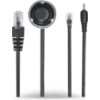Nokia Car Kit CK-100 User Guide - Page 17
Installation, Safety information
 |
View all Nokia Car Kit CK-100 manuals
Add to My Manuals
Save this manual to your list of manuals |
Page 17 highlights
5. Installation Installation ■ Safety information Observe the following safety guidelines when installing the car kit: • Only a qualified service technician should install or service the car kit using the approved original Nokia parts supplied in the sales package. Faulty installation or service may be dangerous and may invalidate any warranty which may apply to the car kit. End users should remember that the car kit comprises complex technical equipment that requires professional installation using special tools and expert know-how. • Instructions given in this guide are general guidelines that apply to the installation of the car kit in an automobile. However, due to the wide variety of car types and models available on the market, this guide cannot consider the individual technical requirements relevant to any particular vehicle. Contact the vehicle manufacturer for detailed information about the vehicle in question. • The car kit is suitable for use only in vehicles with 12-V, negative grounding. Use on other supply voltages or alternative polarity will damage the equipment. • Remember that modern automotive systems include onboard computers where key vehicle parameters are stored. Improper disconnection of the car battery may cause loss of data, necessitating extensive effort for reinitialisation of the system. If you have any concerns, contact your car dealer before any installation work is done. • Do not wire the car kit equipment to the high-voltage lines of the ignition system. • When installing the parts of the car kit, ensure that none of them interfere with or hinder the steering or braking systems or other controls or systems used in the operation of the vehicle (for example, airbags) or disturb your field of vision while driving. Ensure that the car kit and any of its components are not installed where you might come in contact with it in the event of an accident or collision. 17















